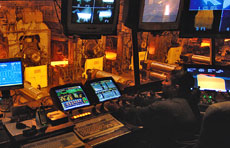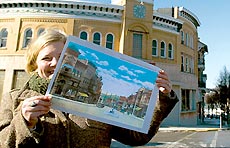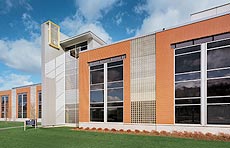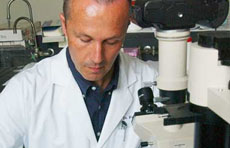Post-industrial Pittsburgh
The Renaissance of American Steel

By the end of the 1980s, Pittsburgh's mighty steel industry had been all but wiped out. But a reorganization of major steel companies and the rise of mini-mills helped the industry reinvent itself, according to Pitt Professor of Economics Frank Giarratani, who has been tracking and analyzing the industry since the 1970s. Giarratani's book, The Renaissance of American Steel: Lessons for Managers in Competitive Industries (Oxford University Press, 1996), explains how the companies that embraced new technology and downsized management helped give the industry new life.
Contact:
Frank Giarratani, professor of economics, director of Pitt's Center for Industry Studies, founding president of the Pitt-based Industry Studies Association, 412-648-1741 (office), 412-371-0984 (home), frankg@pitt.edu
Pitt News Representative Sharon Blake, 412-624-4364 (office), 412-277-6926 (cell), blake@pitt.edu
Re-inventing an Industrial Town

In the early 20th century, the town of Vandergrift, Pa., captured the world’s attention as a model industrial community. Built for steelworkers, the town included amenities unseen in other industrial settlements—like green landscapes and electrical streetlamps—and its design won two gold medals at the 1904 World’s Fair. Now, Vandergrift is hoping to impress the world again. With help from the University of Pittsburgh, this town 33 miles east of Pittsburgh is working to become an environmentally sustainable community. Pitt faculty and students are developing new technologies to supply the business district with free, clean-source hydrokinetic power from the town’s river. They’re also helping citizens to evaluate their energy consumption and adapt to “greener” lifestyles.
Contact:
Lisa Weiland, professor of mechanical engineering and materials science, 412-624-9031 (office), lweiland@engr.pitt.edu
Pitt News Representative Morgan Kelly: 412-624-4356 (office), 412-897-1400 (cell), mekelly@pitt.edu
Pitt Laboratory Building Built on Brownfield Is Gold LEED-certified

The McGowan Institute for Regenerative Medicine building, the site of groundbreaking issue engineering and bioengineering research, became the first university building in Pennsylvania to reach the gold level for its environmental design. Built on a brownfield that had been the former LTV steel site, the building’s shell had already been built when the decision was made to convert it to green. The structure was then “recycled” to meet the standards of the gold certification. Now housing more than 100 scientists, researchers, and staff, the McGowan laboratory building helped launch the economic revitalization of an historic Pittsburgh neighborhood that had been devastated by the loss of the steel industry.
Contact:
Park Rankin, University architect, 412-624-9534 (office), 412-849-4363 (cell), plr2@pitt.edu
Pitt Associate Vice Chancellor National Media Relations Maddy Ross, 412-624-4379 (office), 412-298-4972 (cell), maross@pitt.edu
Pittsburgh Supercomputing Center

The Pittsburgh Supercomputing Center (PSC) is a high-performance computing and networking center that provides university, government, and industrial researchers with access to several of the most powerful computing systems in the nation. The center’s mission is to offer a flexible environment for solving the largest and most challenging problems in computational science. PSC is a resource provider in the TeraGrid, a National Science Foundation program of coordinated cyberinfrastructure for education and research. Within the Teragrid, PSC works to harness a full range of information technologies in order to enable discovery in U.S. science and engineering.
Established in 1986, PSC is a joint effort of the University of Pittsburgh, Carnegie Mellon University, and the Westinghouse Electric Company and is supported by the Commonwealth of Pennsylvania, several federal agencies, and private industry.
Contact:
Ralph Roskies, co-scientific director of PSC and professor of physics at Pitt, 412-268-4960 (office), 412-624-9055 (lab), Faculty Bio
Pitt Associate Director of News John Fedele, 412-624-4148 (office), 412-225-6384 (cell), jfedele@pitt.edu
Office of Technology Management

The Office of Technology Management (OTM) serves as the hub of all technology commercialization activities at Pitt. The OTM is responsible for the protection, management, and commercialization of intellectual property for the University. Faculty members are the primary source of intellectual property, either through the invention of new products or processes, or through know-how and expertise in certain fields. The OTM works with Pitt faculty, students, and staff on all aspects of the commercialization process, from protecting potentially commercial ideas through the patenting process to soliciting licensing contracts and creation of spinoff companies. It works to foster new relationships with industry—long lasting partnerships in sponsored research, new innovation development, technology outlicensing, and the formation of start-up companies.
Contact:
Marc Malandro, director of the Office of Technology Management and associate vice chancellor for technology management and commercialization, 412-624-8787 (office), 412-335-6058 (cell), msmalandro@otm.tt.pitt.edu
Pitt Associate Director of News John Fedele 412-624-4148 (office), 412-225-6384 (cell), jfedele@pitt.edu